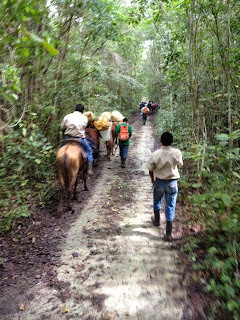Nature As A Classroom
For the last two weeks my students and I have been in Petén, Guatemala, studying the ecology of the region. For half that time we stayed with local families. Our homestays were arranged by the Asociación Bio-Itzá, an indigenous Maya conservation organization that runs a Spanish school to support their work in preserving a section of the Maya Biosphere Reserve. The other half of the time we spent on the reserve and hiking the Ruta Chiclera, a forty-mile trek through the Zotz and Tikal reserves, vast areas of largely unbroken subtropical forest.
These are not always easy conditions. Many hard-working Guatemalans live in poverty that is hard to conceive in our country; it is hot and wet except for when it is cold and wet; biting insects are everywhere; disease and snakes and thorny vines like bayal are constant threats.
But it is also a beautiful place with astonishing biodiversity and remarkable people whose resilience and generosity always make me want to improve my own character. They welcome us into their homes and into their lives, and they are glad to see us come to appreciate the place they live.
I expect that my students will forget much of what I say in my lectures and much of what they read in books. But I doubt very much that they will forget the people they have met here. Guatemala has gone from being an abstraction to a concrete reality. When they meet kind people of good character who have walked across Mexico and made it into the USA only to be caught and deported, "illegal immigrants" now have a face, a home, a family at whose table my students have received a nourishing and welcoming meal.
Likewise, they will not likely forget the sound of howler monkeys at night or the experience of scrambling up Maya temples still covered in a thousand years of trees and soil. They won't forget the long walk in a deep green forest and the smells of tortillas and beans cooked over a wood fire.
It is expensive to bring students so far. One could object that the money could be better spent on viewing the forest online or donating it to rainforest conservation. I disagree. I'm not in the business of dispensing information; I'm in the business of transforming lives, and not much transforms like full-bodied experience. Before we leave for Guatemala my students read papers written by wildlife conservation researchers. In Guatemala they meet those researchers in person and get to hear their stories. They hear in their tone and see in their eyes what brought them to Guatemala and what keeps them here. In such times my students go from taking in data to rethinking their lives.
It is my hope - my exuberant, perhaps not wholly rational hope - that out of such lived experience of nature my students will become people who comfort orphans and widows in their distress, who receive the foreigner into their own homes, who marvel and the world's diversity and who, for the rest of their lives, work to preserve it.
These are not always easy conditions. Many hard-working Guatemalans live in poverty that is hard to conceive in our country; it is hot and wet except for when it is cold and wet; biting insects are everywhere; disease and snakes and thorny vines like bayal are constant threats.
But it is also a beautiful place with astonishing biodiversity and remarkable people whose resilience and generosity always make me want to improve my own character. They welcome us into their homes and into their lives, and they are glad to see us come to appreciate the place they live.
I expect that my students will forget much of what I say in my lectures and much of what they read in books. But I doubt very much that they will forget the people they have met here. Guatemala has gone from being an abstraction to a concrete reality. When they meet kind people of good character who have walked across Mexico and made it into the USA only to be caught and deported, "illegal immigrants" now have a face, a home, a family at whose table my students have received a nourishing and welcoming meal.
Likewise, they will not likely forget the sound of howler monkeys at night or the experience of scrambling up Maya temples still covered in a thousand years of trees and soil. They won't forget the long walk in a deep green forest and the smells of tortillas and beans cooked over a wood fire.
It is expensive to bring students so far. One could object that the money could be better spent on viewing the forest online or donating it to rainforest conservation. I disagree. I'm not in the business of dispensing information; I'm in the business of transforming lives, and not much transforms like full-bodied experience. Before we leave for Guatemala my students read papers written by wildlife conservation researchers. In Guatemala they meet those researchers in person and get to hear their stories. They hear in their tone and see in their eyes what brought them to Guatemala and what keeps them here. In such times my students go from taking in data to rethinking their lives.
It is my hope - my exuberant, perhaps not wholly rational hope - that out of such lived experience of nature my students will become people who comfort orphans and widows in their distress, who receive the foreigner into their own homes, who marvel and the world's diversity and who, for the rest of their lives, work to preserve it.
